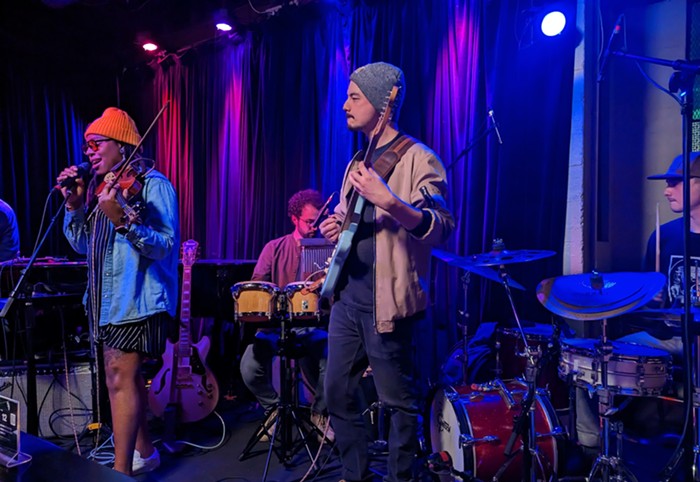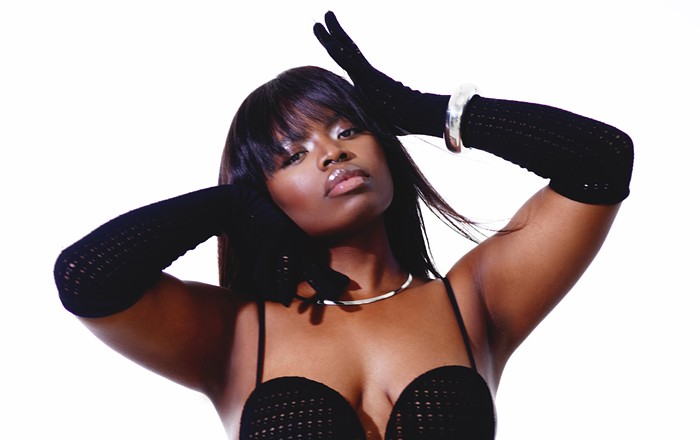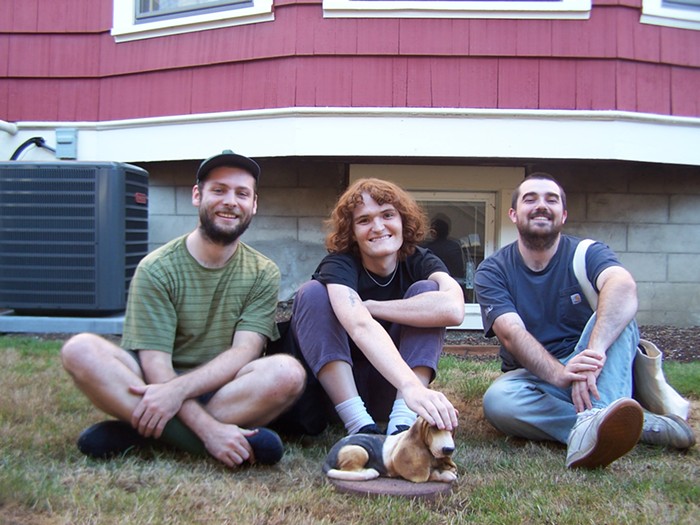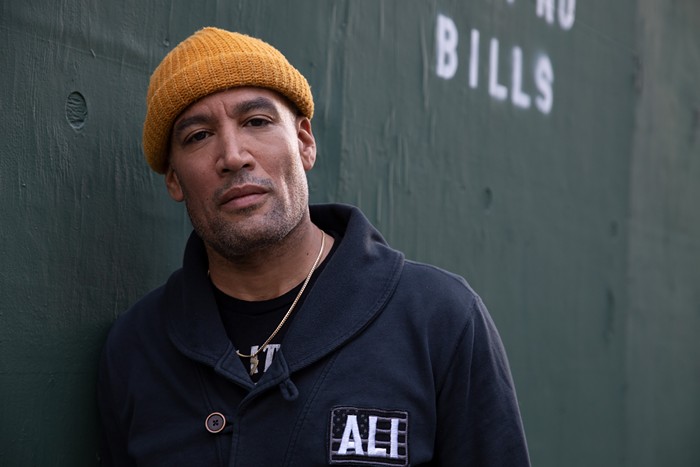MERCURY: What planted the ska seed for you when you were younger?
DAVE WAKELING: Well it was a mixture of many things, really. It had more to do with, at the time—whether by affinity or accident—punk and reggae had become pretty common stable mates on festival-type shows and socially, as well. I think punks and Rastas were banned from an equal number of the same bars, so we were forced together. We used to run house parties with one punk DJ and one reggae DJ in the opposite corner, and we found that if we mixed it up in the evening the dance floor never got quiet. The adrenaline in the punk seemed to mesh with the sensuality of the reggae and the combination of the two just made this groove.
Andy [Cox], the guitarist from the Beat said at one point at a party, "Well, what if you got both elements of the two DJs into a three-minute pop song, what would you have then?" That was the brief. Your mission, should you accept it.
Whenever you hear about the history of the two-tone movement, you always hear about the Specials, the Selecter, and the Beat. Were you guys aware of each other at the time?
It started off separately, but we became aware of each other before it exploded, although the Specials were a bit further down the path then we were. What had happened when we tried to blend our punky reggae beat together, we noticed that it was quite similar to the ska beat that had been popular on the football/soccer terraces nine or 10 years before. We used to go to soccer games and they used to play this music, it was the music of the soccer skinheads at the time and so it was kind of by happenstance that we found ourselves suddenly able to play with a lot of our favorite ska bands from back in our early teens. And that's how we ended up being a ska band, I suppose.
The Specials asked us, "Would you like to do a single on their new record label, 2 Tone," and we said yes. By the time our record came out, two tone was the ska sensation sweeping the nation. From that point on we were ska regardless of the fact that "Mirror in the Bathroom," "I Confess," and "Save it for Later" don't really have more than even a passing reference to a ska beat.
"Save it for Later" is probably your highest chart topper, right?
I think so. We did very well with remix tracks. With those remixes we had a few number ones on the Billboard 10 chart, but we had more album success than single success, especially early. So with the early Beat songs they didn't really show up [on the charts] although the albums stayed for weeks and weeks. But we really didn't do singles until, after the English Beat was General Public and Fine Young Cannibals that started having top 40 hits with IRS [Records].
Do you feel that IRS was the best label for you at the time?
Miles [Copeland, founder of IRS records] had collected some very interesting people around him. Certainly there was a point of stasis in the music business surrounding radio; it seemed to cost so much money to get a top 40 station to play your song that only the wealthy and entrenched could even play the game. And so I thought it was a clever idea for IRS to try and circumvent that by not paying any attention at all, instead applying all their talent, time, energy, and what money they had to things like college radio, which was cheaper but also could get you a lot of direct contact with your niche audience.
So it seemed like a very clever idea. It's sort of become a bit sullied over the decades, because, sadly, we never really got paid. Certainly not since 1992. The IRS river dried up. And we're actually just in the process of getting all of our catalog.
You haven't been getting any money from your catalog?
No, not at this point. We're just going to start again with the catalog. We're going to get our babies back. Instead of being paid—in lieu of payment—we're going to at least get to control our songs once again.
They've lost a lot of opportunities because people have been aware when they're trying to license a song for a film that there's something of a controversy between the artist and the label. People who are licensing songs don't want to get embroiled in that because they have very short deadlines and they're playing with very large amounts of money. A lot of General Public's songs, for example, have been very underutilized in recent years, ever since the trouble started to brew. I think "Tenderness" was used in Clueless and sort of set the song for a whole generation, but it hasn't had much uses since.
You live in Los Angeles; are you happy there?
I'm absolutely ecstatic. I'm sitting on the balcony looking at my freshly planted window boxes, mountains in the background, and am absolutely naked. Perfect day. It's a little bit hard to miss where I was from [Birmingham, England]. I go back to visit fairly regularly, and I seem to fit in less and less each time. But then again, I was never very happy, even as a kid. I was the rebellious type. And there was something, I suppose, if you imagine what the dark force was that Monty Python was poking its fun at. The sort of supercilious and jingoistic behavior that they were trying to puncture with that comedy. It drove me nuts as a kid. Nothing made sense at all.
I became kind of a young Benjamin Franklin. I was staunchly anti-monarchist. Not so much that they were bad folks in themselves—I'm sure they were very decent types after a gin and tonic—but what it represented was the top piece of a pyramid. With them being there, it insisted the rest of the pyramid had to stay in its place, too. So there was an archaic success by association with nobility, and it still irritates me. I was far more excited by the Beatles sending their medals back, than by having to continually hear about "Sir" Paul McCartney or "Sir" Elton John. I thought it just made some of the obvious inequalities of the 19th century perpetrate too long into the 20th century, and it made England slow to react as a country to the changing world around it. I just found it eminently frustrating, although, as I'm sure, you know we have our problems over here.
Does it feel like the same problem over here?
I don't find it the same. In a different way, perhaps, but not to the same degree.
Did you take any heat then for "Stand Down Margaret?"
We got away with it for a little while. Thatcher's people came up with this beautiful lie that it was a famous old calypso dance from the Caribbean called "The Stand Down Margaret," where you kind of walk backward with a little jump. Kind of like a merengue.
We told people it was about that and we got to do it live on TV. They all thought it was this dance and we all got T-shirts of Margaret Thatcher as a robot; just her head on the body of a robot. A real robot, actually, with a big nuclear mushroom in the background, and it was live on television and there was nothing they could do. The game was up. But they'd learned from the Sex Pistols days that if you banned the record, it became so much fun, even people who didn't like the record would go out and buy it just so it would stay at #1 and they could watch the people on the TV be embarrassed on Top of the Pops when they wouldn't be able to announce the #1 song because it was banned.
That would have been great had the song been banned.
Oh we were begging for it. Absolutely begging. But they'd learned their lesson, and so they just slowly stifled it by giving it less and less airplay until it just appeared to have run its course. It did all right. I mean, it did get into the top 30, but it didn't get into the top 10. They caught it, I think, at about #21.
I read a fantastic article from some sort of secretary to Margaret Thatcher's government. He was a young man at the time and he loved the Beat, and he loved the song "Stand Down Margaret," but he never understood what we had against Princess Margaret, because he thought she was the best—the most interesting of the royals. You'd like to think that your words are going straight to the heart of the powers that be and as Margaret Thatcher's just about to close all the mines, somebody runs in and goes, "Oh! Mrs. Thatcher, the Beat have got a brand-new album. I think you'd better read these lyrics before you do anything!" You'd like to think you're having some effect, but it turned out that this guy thought that the song was about a different Margaret than the one he was working for. He thought the song was about Princess Margaret. So you take it all with a grain of salt when it comes to exactly how much social change you're managing to affect with your clever words.
Can you talk about the split up of the band?
It was more frustration than anything. Some of the guys were fed up with the touring mill we'd suddenly found ourselves a part of. I suppose the combination of not really liking playing live very much—some of them, anyway—and doing it a bit too much, along with the sort of punk ethos of "Oh god, we've just turned into a stadium super group" started to creep in. As we became more and more successful in America, our success, and our time in the limelight, was starting to disappear in England.
The New Romantics had come—all dressed in their mom's clothes and made-up with lipstick—and all of a sudden that sort of agit-pop, men of the people, let's all go on an unemployment march together seemed utterly dour. To some people in the band, I think it made them think that we should stop and they took the fact that we were a stadium-sized band in America as further proof that it was time to finish. I was a bit confused by it. I was like, "Yeah, that was terrible when 15,000 people thought we were really great last night. Sucks. It sucks!"
Me and [Ranking] Roger continued as General Public while Andy and David [Steele] had the two years off they wanted, then they came out with Fine Young Cannibals. They were right. Everybody was right. But nobody seemed right at the time, you know? The camaraderie within the group had started to break down. Me and Andy had promised each other that if the magic started to disappear, we wouldn't just keep whipping it like it was a corporation.
So I decided to pull the plug, although, frankly, I felt like the group hadn't been doing anything for a good few months. I felt like I was just the first person to say, "Oh this body's starting to smell a bit, isn't it?" But by being the one that said that, for a little while then, I was the evil one. I think it's all right now.
Do you still talk with them?
Yes, on occasion.
I always found it curious that Fine Young Cannibals did their first two albums then suddenly stopped.
I think there was another one in the works, but I think it ground to a halt whilst there was another one in the works.
When they got so popular, were you happy for them?
No. I was jealous as hell. When they were #1 around the world every time I walked into a nightclub they'd play "She Drives Me Crazy" just to see whether I'd dance to it or storm off.
And it drove you fucking crazy?
It drove me absolutely crazy. I would dance to the end of the song and then leave the club surreptitiously and not go there again [laughs].
What's in your CD player right now?
Well, funny you mention that: There are two CDs [stuck] in the player so we won't be listening to anything. There's one of the kids' CDs, and they both insist it was the other one who put it in. They put it in on top of Heart of the Congos by the Congos, which, in my estimation, is the best reggae record ever made. Produced by Lee Perry when he was firing on all cylinders, it's the most sublime reggae production with the best voices. A little bit Old Testament in its imagery, but redemptive despite that. So those are the two CDs that are in there, and until I go and pay somebody $300 to take that whole front console out.
Between the Fine Young Cannibals question, and the stuck CDs, I'm going to be sending you to the therapist's couch for a couple of hours.
You'd probably make a good therapist. You seem to be able to get to those dark places, the little knots in my life.



















